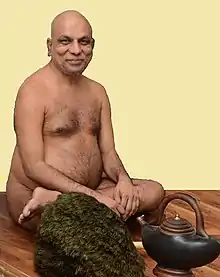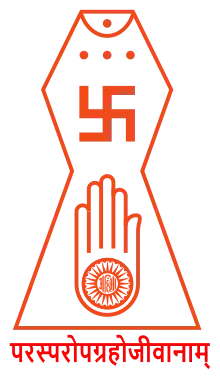Pramansagar
Munishri Pramansagarji Maharaj is a Digambar monk of Terapanth sub-sect. He is an able disciple of Acharya Shri Vidyasagar Ji Maharaj. He has set free the religion from traditional abstruseness and made it practicable in life. Through his sermons and initiatives, the process of a qualitative change in society has begun. He led a campaign to save the Jain tradition of Santhara also known as Sallekhana in the year 2015,[1] in which millions of Jain community members took out massive silent rallies in several cities and towns all over the world against the Rajasthan High Court decision.[2] Gunayatan is one of his important religious initiatives which is going to become a centre for self-development in the true sense. His pravachans and Shanka Samadhan programme are aired on Jinvani Channel and Paras TV Channel.
Muni Shri 108 Pramansagar Ji Maharaj | |
|---|---|
 | |
| Personal | |
| Born | Naveen Kumar Jain 27 June 1967 |
| Religion | Jainism |
| Parents |
|
| Sect | Terapanth Digambara |
| Religious career | |
| Initiation | 31 March 1988 Sonagiri by Acharya Vidyasagar |
| Website | www |
| Part of a series on |
| Jainism |
|---|
 |
Life
Muni Pramansagar was born on 27 June 1967 in Hazaribagh, Jharkhand as Naveen Kumar Jain in the house of Shree Surendra Kumar Jain and Smt. Sohni Devi Jain [3][4] He got Vairagya on 4 March 1984 and was initiated as a Digambara monk by Acharya Vidyasagar ji on 31 March 1988 in Sonagiri.[5]
On the issue of Sallekhana controversy, he said:"Santhara is not a suicide. Jainism considers suicide a sin. Followers of every religion do penance through different means and Jainism also does so for self-purification"[6]
Muni Pramansagar is a Digambar monk who took initiative in Dharmbachao Andolan to oppose the Rajasthan High Court's decision to ban Sallekhana,[7] the decision of Rajasthan High Court was subsequently suspended by Supreme Court of India.[8][9] He also organized programme for chanting Jain hymn Namokar Mantra 1 crore times.[10] Gunayatan is one of his other religious initiatives. His pravachans and Shanka Samadhan programme are aired on Jinvani & Paras TV channel.[11]
As per religious protocol for Jain monks, Muni Pramansagar Ji does not stay at one place for long except for 4 months in rainy season (Chaturmas). His 2016 Chaturmas was in Ajmer, Rajasthan. He visited Kuchaman, Rajasthan in June 2016.[12][13]
Works
Muni Pramansagar is a known scholar of Hindi, Sanskrit, Prakrit and English languages. He has authored several books on Jainism and Jain philosophy as listed:- Jain Dharm Aur Darshan, Jain Tattv Vidya,[14] Divya Jeevan Ka Dwar,[15] Jyotirmay Jeevan, Jeevan Utkarsh Ka Aadhaar, Lakshya Jeevan Ka, Antas Ki Aankhen, Jeevan Ki Sanjeevani, Jain Siddhant Shikshan, Path Pade Nav Jeevan Ka, Andaaj Jeevan Jeene Ka, Ghar Ko Kaise Swarg Banayen, Sukhi Jeevan Ki Raah,Dharm Saadhiye Jeevan Mein,Marm Jeevan Ka.
Muni Pramansgar has evolved ‘Bhawana Yaga’ by redefining the ancient Indian dictum of 'Yad bhavyaate tad bhavati' (thought becomes things) in the modern form to make the body healthy, the mind cool and the soul pure.[16]
References
- "Muni Shri Praman Sagar talks about the tradition of Santhara", News18, Uttar Pradesh, ETV Rajasthan, 13 September 2015, archived from the original on 2 November 2015, retrieved 17 September 2015
- The Jain religion and the right to die by Santhara, Rajasthan, The Indian Express, 2 September 2015
{{citation}}: CS1 maint: location missing publisher (link) - "Muni Shri 108 Praman Sagar Ji Maharaj", Jain Muni Locator
- Jaipuriar, Vishvendu (30 May 2013), Jumbo chariot cheer amid 'holy' rain, Hazaribagh: The Telegraph, archived from the original on 4 March 2016
- "Jain Muni Pramansagar ji Maharaj disciple of Acharya Vidyasagar ji Maharaj would discourse on Ramayana and Geeta at the local Zila school ground from November 7 to 11. The four day programme being organised by Vishwa Dharma Jagaran Manch is expected to garner huge crowd in wake of the popularity that Maharaj has gained while giving similar discourse in other cities of the country.", The Times of India, 27 October 2010
- Staff, Pratika (11 August 2015), "Fatal blow: why the Jain practice of voluntary death is a crime", Catch News
- Sharma, Lalit (10 August 2015), "Rajasthan high court bans Jain ritual of fasting unto death", Hindustan Times, Jaipur, archived from the original on 11 August 2015
- viadyanathan, A, Jain 'Santhara' Ritual of Fast Unto Death Can Continue for Now, Says Court
- Staff, BBC (31 August 2015), "India top court lifts ban on Jains' santhara death fast", BBC News
- Singh, Mahim Pratap (1 September 2015), "Hours after SC ruling, octogenarian 'resumes' Santhara in Bikaner", The Indian Express, Jaipur
- Programs, Jinvani channel
- "दिखावे का भक्ति में कोई स्थान नहीं हैं : मुनि", Dainik Bhaskar, 11 June 2016
- "चातुर्मास के लिए बैठक कल", Dainik Bhaskar, 29 April 2016, archived from the original on 18 August 2018, retrieved 16 August 2016
- Pramansagar, Muni (2008), Jain tattvavidya, India: Bhartiya Gyanpeeth, ISBN 978-81-263-1480-5
- Muni Shri 108 Praman Sagar Ji Maharaj, Jinaagamsaar, archived from the original on 14 February 2017, retrieved 17 September 2015
- Pramansagar, Muni (2020), Bhavna Yog, India: Nirgranth Foundation, ISBN 978-81-943516-0-3